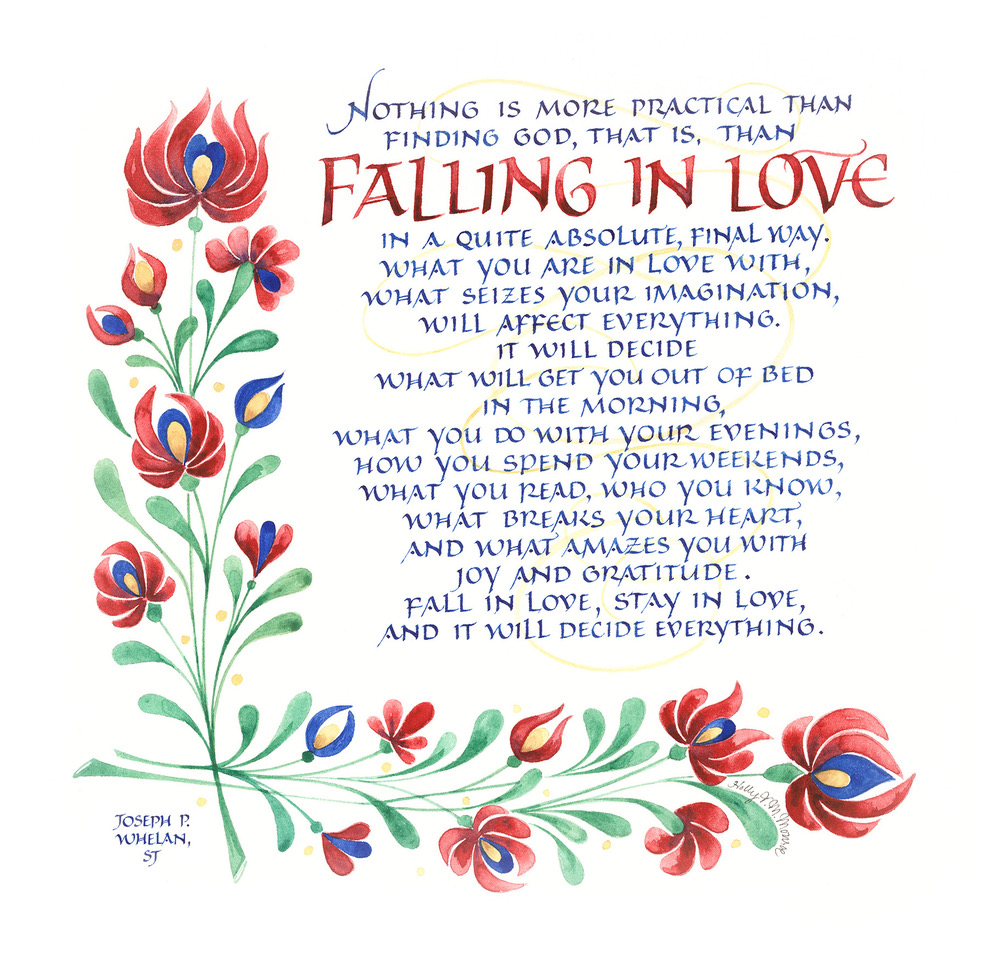Falling in Love
I spent my entire last year of college waiting to get into the Jesuit Volunteer Corps, your typical, post-graduate year of service program. I thought that I would love it. I didn’t.
The top floor bedroom, that was mine, was sweltering.
The city was noisy, dirty, disorienting.
My foot broke.
And the children at my ministry site reminded me every day how much they preferred Mary, the previous volunteer, over me. Or so it seemed.
I returned home in the evenings and brooded.
Volunteer houses are often repositories for left-behind items waiting to again become sources of comfort, inspiration and wisdom for emerging adults starved of certainty: Stained cookbooks, paperback classics with bent spines, religious artwork torn from newspapers — or words someone found fit to frame and hang. One such artist’s rendering spoke to me from the wall and became chiseled into my consciousness, over time its colors and calligraphy becoming inseparable from the message they conveyed:

These words, long attributed to Pedro Arrupe, SJ (although more recently, believed to have been authored by Joseph Whelan, SJ) — in a place where light and other pollution obscured the sky, leading to many a restless night — became a North Star for me. I have gifted these words to countless wedded couples over the years. For me they have always spoken to the broader meaning of vocation lived out in the day-to-day — this pursuit of a God so often hidden in plain sight.
My love for them made no sense, and I could only trust that it came from God.
When I first encountered these words, I was so enamored with the idea of definitively responding to God’s call. I was convinced that serving as a Jesuit volunteer, while challenging, would be filled with consistent affirmations and a subtle yet discernible prompting of where to follow next. As the year unfolded, I was disheartened to discover this was not the case. I had entered into this experience wholeheartedly — having that heart crushed — time and time again. Especially with those kids; those grouchy, cynical kids who had so much of the joy stomped out of their childhoods. They rolled their eyes, made fun of my rules and called my “fun” activities “corny.” Yet they were often my first thought in the morning, the ones I fretted about in the evenings and who I made plans for over the weekend.
There came a day that my eyes visited those words on the wall, and I immediately thought of the kids. And I realized I had fallen in love with them without intending it — inescapably, irrevocably. And it did not matter whether they ever gave me any sense that this was reciprocated. (Although they did eventually, in their own ways.) My love for them made no sense, and I could only trust that it came from God. Or even that it was God loving them. That was enough for me.
As is the structure of these volunteer experiences, I left those children behind at the end of the year. Inevitable heartbreak ensued for all of us. Nevertheless I believed my own heavy heart would find a resting place in a permanent, future commitment. This still point has proven to be elusive. Contrary to the promise of those framed words, there has been no absolute “falling in love,” no finality to any part of it. I have led a physically and spiritually nomadic life. As a consequence, so many of my relationships have had a transitory quality. My work, my ministries, have been varied.
“You have done so many different things,” they said at my last interview. “Are you a religious sister?” I laughed at the question that could have been confusion or a compliment. I laughed at myself. Maybe I am incapable of loving deeply or I am like a young fool, older now, falling in and out of love. Laughable.
I remember my friends who have married. Why did I presume to give those words to them? Perhaps it was like an offering, a prayer, that in their vows, their profession of love they found that “absolute, final way,” that touchstone, that sacred centering place — and so confirmed, gave witness to Love in the living of their lives. Is it naïve optimism, or hypocrisy for me to offer this - “Nothing is more practical” than this Falling in Love, which “will decide everything.” — when the quest for God has seldom been practical for me, and often, the choices are seemingly unclear, or non-existent. Besides, although most will fall in love, who stays in love? Such a faint-hearted view presumes that kind of fire can’t be sustained and burns itself out quickly. But what if we weren’t the only actors when it comes to love? What if Love, in all its goodness and God-ness opens itself up for us and lets us stay always and all ways? Through mornings, evenings and weekends through the arrivals and departures through joy and gratitude as well as the broken hearts in grief and loss in celebration riches and poverty sickness and health better and worse? And what if we get to come back if — when — we do fall out or away? Doesn’t that sound like Love? Maybe not any Love we have ever known. I’ve known a lot of less-than-perfect love, my own included. But maybe it’s a Love that sounds like God. Maybe Love is the only God we ever know.

ABOUT THE AUTHOR
Angela Paviglianiti practices social work in Chicago where she also completed seminary; however, she has not yet mastered divinity. On Tuesday and Thursday evenings, you can find her at The Fireplace Community, and on other days, you can usually find something she forgot there.






